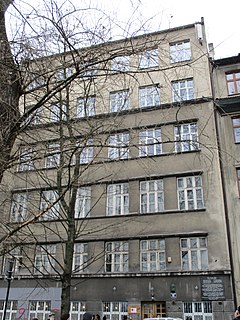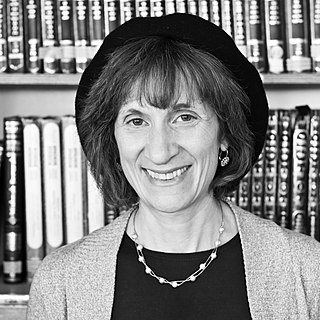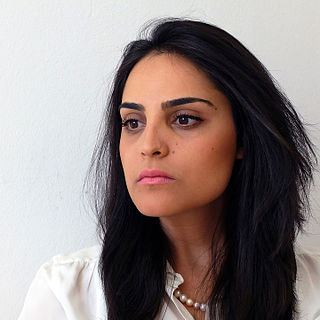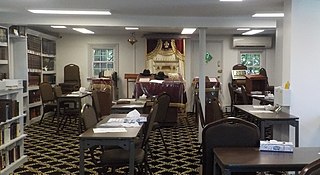
Pirkei Avot, which translates to English as Chapters of the Fathers, is a compilation of the ethical teachings and maxims from Rabbinic Jewish tradition. It is part of didactic Jewish ethical literature. Because of its contents, the name is sometimes given as Ethics of the Fathers. Pirkei Avot consists of the Mishnaic tractate of Avot, the second-to-last tractate in the order of Nezikin in the Mishnah, plus one additional chapter. Avot is unique in that it is the only tractate of the Mishnah dealing solely with ethical and moral principles; there is relatively little halakha (laws) in Pirkei Avot.
Chaim of Volozhin was a rabbi, Talmudist, and ethicist. Popularly known as "Reb Chaim Volozhiner" or simply as "Reb Chaim", he was born in Volozhin when it was a part of the Polish–Lithuanian Commonwealth. He died there while it was under the control of the Russian Empire.
Rosh Pina is a lay-led independent minyan in Washington, D.C. It meets for Shabbat morning services twice a month in the National Museum of American Jewish Military History (NMAJMH). It also meets occasionally for Friday night and holiday services, in addition to organizing social and educational events such as shabbatonim and parties to celebrate Hanukkah, Purim and other Jewish holidays.

A midrasha is an institute of Torah study for women, usually in Israel, and roughly the equivalent of a yeshiva for men. A "seminary" is a similar institution, more traditional in orientation. Midrashot are Religious Zionist, while Seminaries are usually Haredi; although in English, "Seminary", or "Sem", is often used for either.
Partnership minyan is a religious Jewish prayer group that seeks to maximize women's participation in services within the confines of Jewish law as understood by Orthodox Judaism. This includes enabling women to lead parts of service, read from the Torah, serve in lay leadership positions, sit in a more gender-balanced format, and in some cases count as part of a minyan ("quorum") of ten men and ten women. Partnership minyanim began in 2002 simultaneously in New York and Jerusalem, and have now spread to over 30 communities in at least five different countries around the world.
Yeshivat Chovevei Torah Rabbinical School (YCT) is a Modern Orthodox yeshiva, founded in 1999 by Rabbi Avi Weiss.

Irving Yitzchak Greenberg, also known as Yitz Greenberg, is an American scholar, author and rabbi. He is known as a strong supporter of Israel, and a promoter of greater understanding between Judaism and Christianity.
The Zilberman Method is a system of teaching the Torah to young students, pioneered by Jerusalem rabbi Yitzchak Shlomo Zilberman, that emphasizes rote learning of the text, while leaving the more advanced study of Talmud to older students. Schools employing the method are colloquially referred to as Zilberman Schools.
Orthodox Jewish feminism is a movement in Orthodox Judaism which seeks to further the cause of a more egalitarian approach to Jewish practice within the bounds of Jewish Law. The major organizations of this movement is the Jewish Orthodox Feminist Alliance (JOFA) in North America, and Women of the Wall (WOW) and its affiliates in Israel and internationally, known as The International Committee for Women of the Wall (ICWOW). In Israel, the leading Orthodox feminist organization is Kolech, founded by Dr. Chana Kehat. In Australia, there is one Orthodox partnership minyan, Shira Hadasha, in Melbourne.

Judy Klitsner is a contemporary Bible scholar, author and international speaker. She is a senior faculty member of the Pardes Institute for Jewish Studies in Jerusalem, where she has taught Bible and biblical exegesis for more than twenty years.

The DC Minyan is a lay-led Jewish congregation in the Dupont Circle area of Washington, D.C., with programs including Shabbat/Sabbath and Holy Day worship services, education, social events, retreats, and opportunities for tikkun olam, improving and transforming the world. The majority of its worship services, educational programs, and special events take place at the Washington, D.C. Jewish Community Center (DCJCC).
An independent minyan is a lay-led Jewish worship and study community that has developed independently of established denominational and synagogue structures within the organized Jewish community. Some began in the late 1990s and most since the year 2000, though some are several decades older. These new groups often combine a commitment to halakha/Jewish law with egalitarianism, and strive to create worship services where traditional prayer can become "spiritual experiences."
Musar literature is didactic Jewish ethical literature which describes virtues and vices and the path towards character improvement.
Shai Held is a rosh yeshiva and Chair in Jewish Thought at Mechon Hadar. He holds a PhD in religion from Harvard University.

Gilah Kletenik is an academic and rabbi.
Rabbi Elie Kaunfer is president and CEO at the Yeshivat Hadar in Manhattan. He is the co-author with Jonathan Sarna of Empowered Judaism (2010), a book that explores independent minyanim and building Jewish communities.
Ethan Tucker is rosh yeshiva and co-founder of Yeshivat Hadar in Manhattan.
Yitzchok Shlomo Zilberman was an Israeli Haredi rabbi and educator, pioneer of the Zilberman Method of Torah study. He founded Yeshivat Aderet Eliyahu, part of a community that follows the path of the Vilna Gaon.

Rabbi David Bigman is a Modern Orthodox Rabbi. Bigman is the head of Yeshivat Ma'ale Gilboa along with Rabbis Yehuda Gilad and Shmuel Reiner. He helped found the Ein Hanatziv Midrasha for girls and used to head the Ein Tzurim Yeshiva. Bigman developed the Revadim technique for the study of Talmud, combining traditional learning methods with academic research tools.

Yeshiva Kesser Torah Rabbinical College of Queens is a synagogue in the Kew Gardens Hills section of Queens, New York. It was founded in 1981 by Elyakim Rosenblatt in the Briarwood section as a kiruv yeshiva. In 1994, it relocated to Kew Gardens Hills. It is known throughout the Queens Jewish community as a "minyan factory", a place where one can find a mincha minyan throughout the afternoon or maariv minyan until late into the night.








